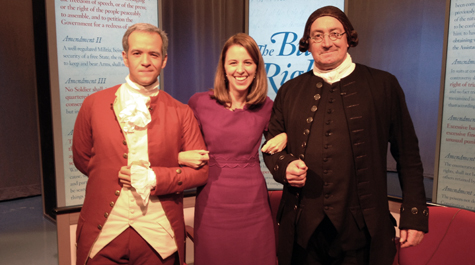Larsen Takes Electronic Field Trip With Founding Fathers
It’s not every day that a 21st-century law professor gets to sit on a panel with such 18th-century luminaries as James Madison and Patrick Henry. But that’s exactly what happened to Allison Orr Larsen recently.
On October 10, Larsen, an associate professor at William & Mary Law School, found herself in Colonial Williamsburg’s Bruton Heights television studio. Sitting next to her were reenactors portraying Madison, the fourth U.S. President, and Henry, the famous attorney and orator whose cry of “Give me liberty, or give me death!” energized a young country fighting for independence.
The three were participating in the first episode of Colonial Williamsburg’s Emmy Award-winning 2013-14 Electronic Field Trip Program. The topic was “The Bill of Rights.”
Broadcast on PBS and in classrooms around the country, Electronic Field Trips are geared toward a 4th to 8th grade audience. Each episode this season involves live, interactive lessons that explore such topics as the three branches of government, 18th-century trades and the Continental Army, the complicated relationships between slaves and their masters, Civil War ironclads, and the War of 1812.
"The goal of the electronic field trips is to bring history to life,” Larsen explains. “And it was definitely lively. We didn’t know the questions in advance, but fielded some very astute, very sophisticated questions from students.”
Among the many questions asked were: “Does the Bill of Rights protect me on the Internet?” “If the 1st Amendment says Congress can’t infringe on free speech, why can’t I say whatever I want whenever I want?” “Why didn’t everyone support a Bill of Rights?” “Does the Bill of Rights apply to noncitizens?”
Larsen was impressed with the reenactors’ ability to field such questions and remain perfectly in character as 18th-century gentlemen. “The actors were very knowledgeable about their subjects and felt they were inhabiting Madison’s and Henry’s spirits,” she says.
As the 21st-century expert, Larsen found herself commenting on the 18th-century philosophy of her fellow panelists. For instance, she jumped in when Patrick Henry spoke about the Constitution being for all people. “That’s right, Mr. Henry, but people who were just like you,” she said.
The result was a dynamic program blending historical philosophy with contemporary constitutional thought.
“We can’t criticize the founding fathers for not understanding a world in which they didn’t live,” Larsen says. “But I was there to add a modern take on things.”
New to the medium of television, Larsen found the format tricky, but rewarding. She not only had to consider her fellow panelists’ responses, but also keep track of the technical aspects of the production.
“I have a newfound appreciation for television hosts,” Larsen says. “It’s a lot harder than it looks to answer a question on the spot while looking at the right camera and listening to the director in your ear--much harder than sitting on a panel at an academic conference. But it was fun, too.”
With two children of her own, Larsen appreciates engaging citizens at a young age, and she hopes young viewers were inspired by the program.
“I hope they got from me that the debates about the scope of their rights continue and will always continue and are important for them to think about now so they can participate in those debates as adults,” she says.
Most of all, Larsen hopes young viewers realize that the framers of the Constitution may not have anticipated questions about text messaging or whether the government can track citizens with a GPS device, but the Bill of Rights still has something to say about such issues.
“That’s what’s really beautiful about the Bill of Rights,” Larsen says. “It’s written in a way that can apply in contexts that James Madison and Patrick Henry never imagined possible.”
About William & Mary Law School
Thomas Jefferson founded William & Mary Law School in 1779 to train leaders for the new nation. Now in its third century, America's oldest law school continues its historic mission of educating citizen lawyers who are prepared both to lead and to serve.
